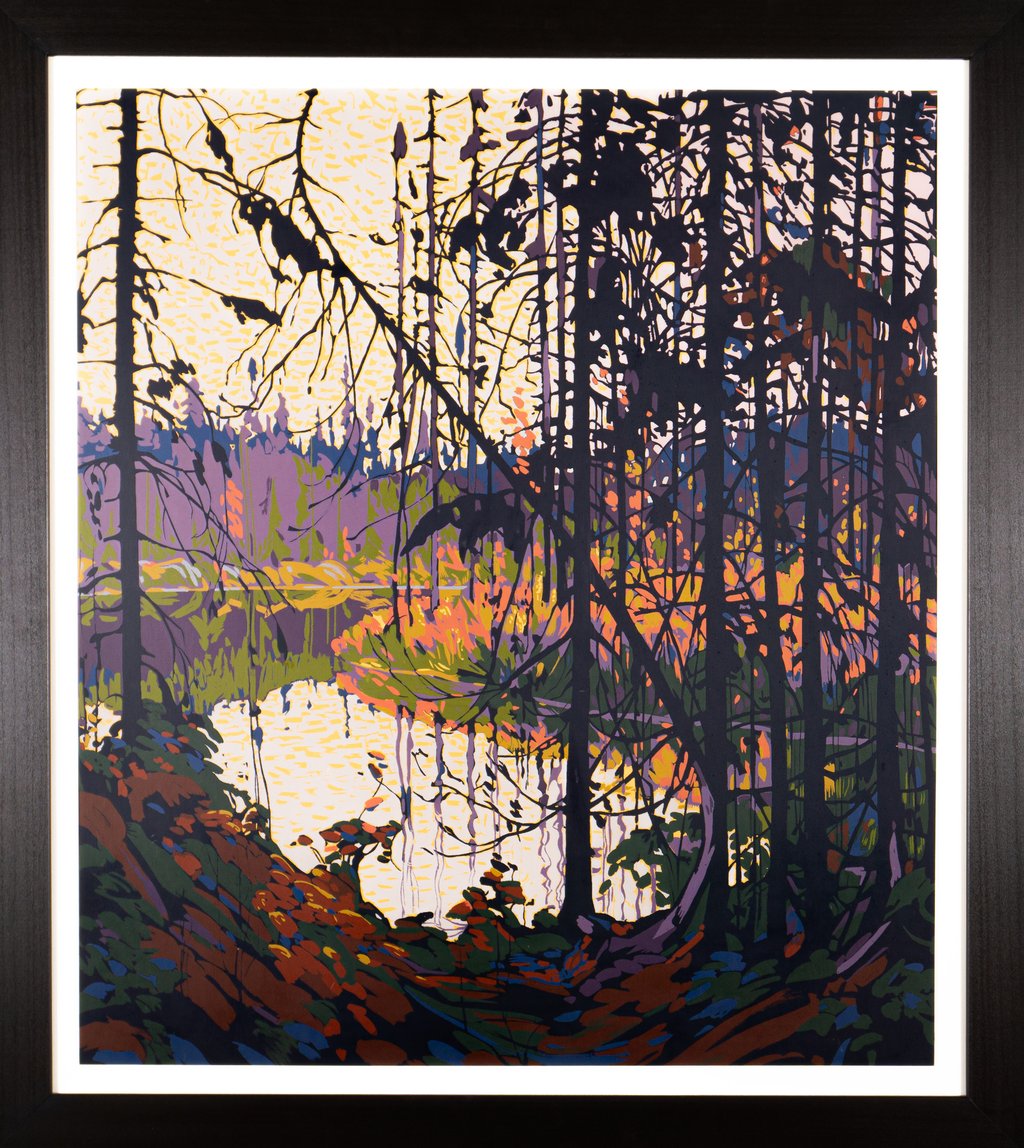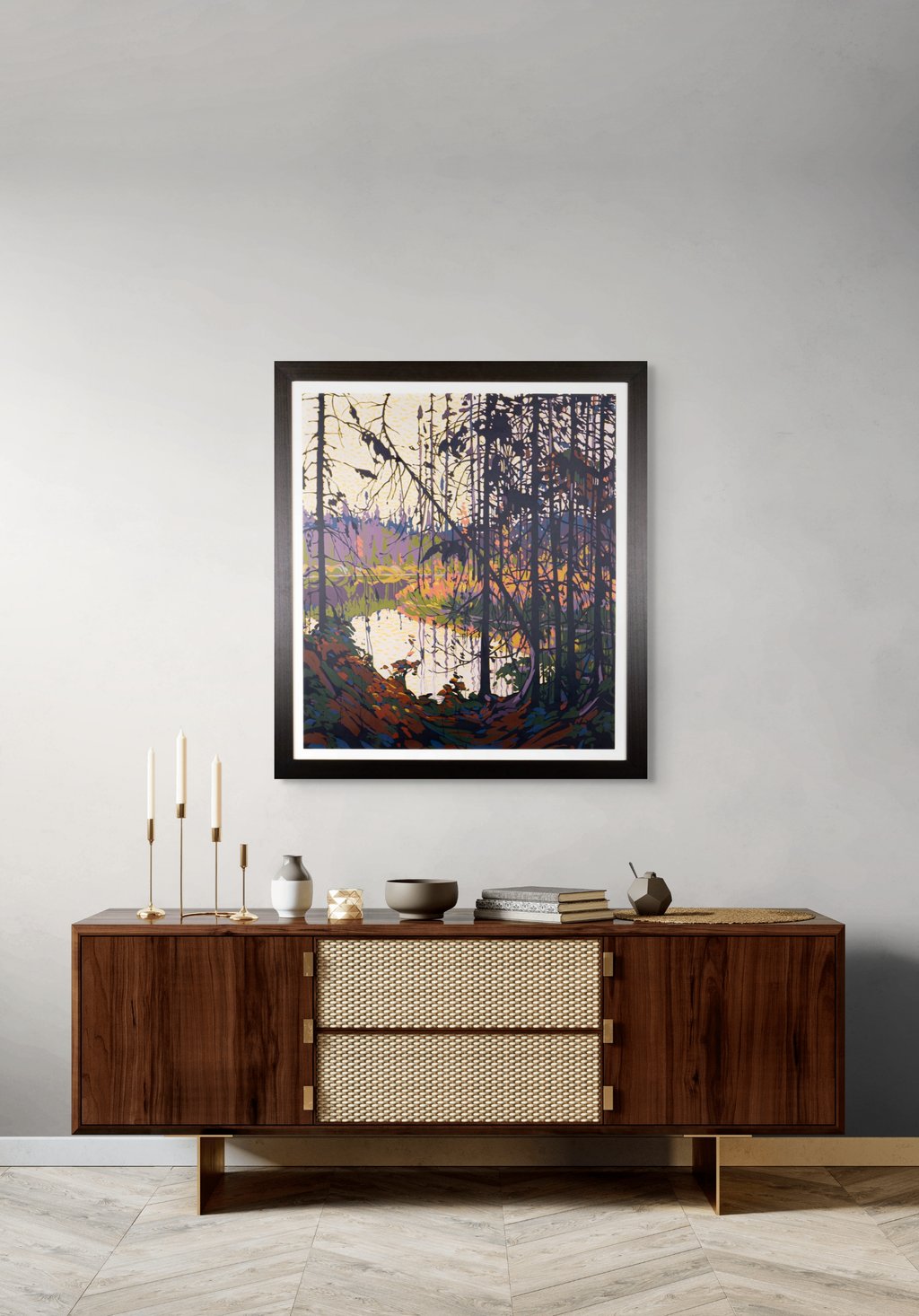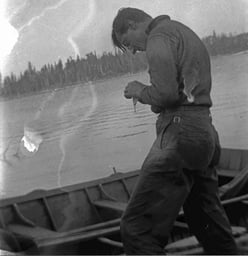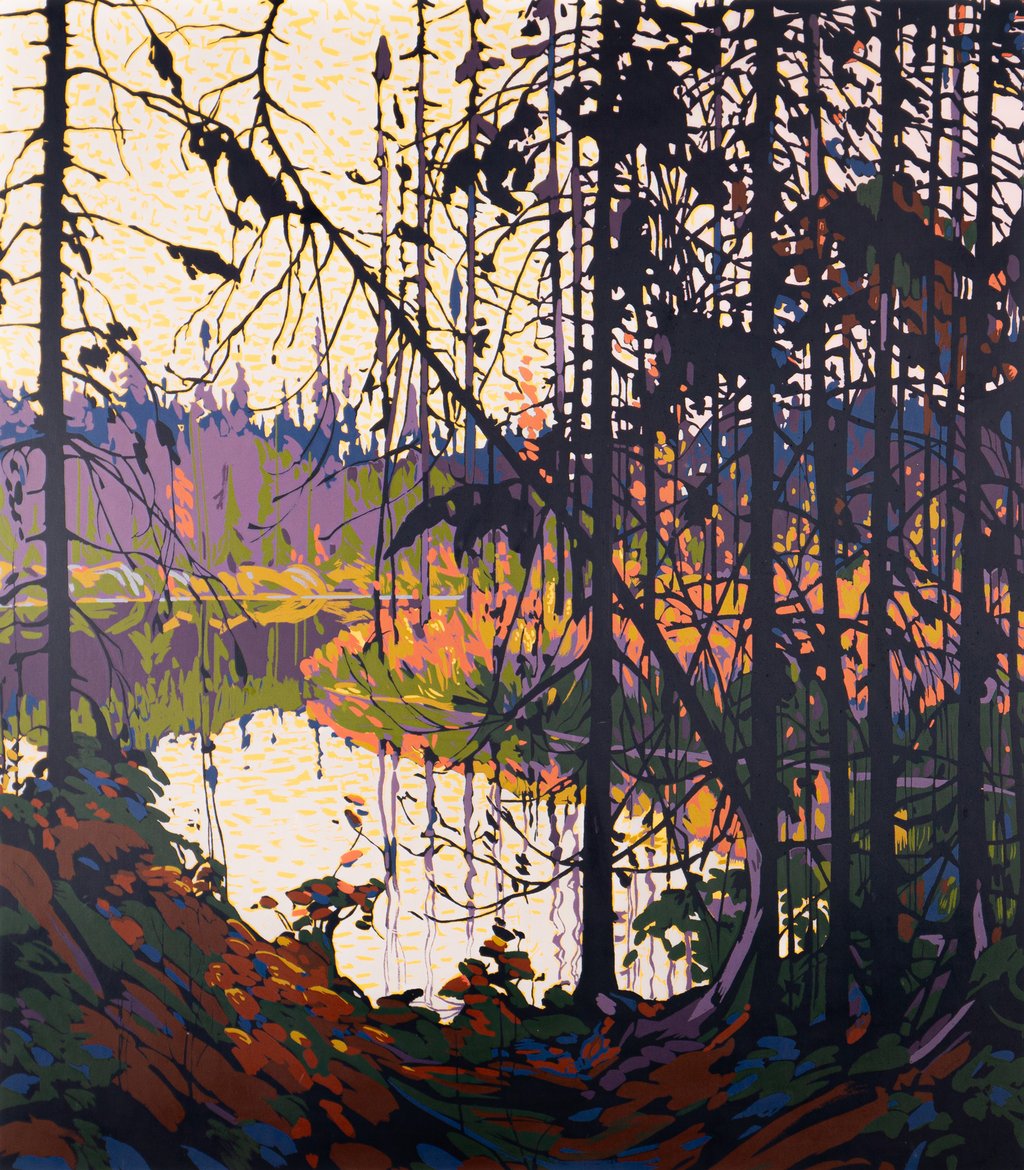Northern River
37.25 x 33.5 x 1 in (94.6 x 85.1 x 2.5 cm) including frame
The Sampson-Matthews print program was the largest public art project in Canadian history. Launched at the start of the Second World War, it lasted twenty-two years and cost tens of millions of dollars in today’s currency. At its height, it employed many of the country’s best commercial painters, designers and artists, working full-time to create masterpieces of serigraphy.


Tom Thomson

Thomas John Thomson (1877-1917) was a Canadian painter whose depictions of the northern Ontario wilderness became iconic representations of the Canadian landscape and a defining influence on Canadian art. Born on August 5, 1877, in Claremont, Ontario, he was the sixth of ten children born to John and Margaret Thomson. The family moved to a farm near Leith, outside Owen Sound, where Thomson was raised in a creative household that encouraged drawing, painting, and music. His father was something of a naturalist, and Thomson's older cousin, Dr. William Brodie, was a prominent naturalist who served as director of the Biological Department at what is now the Royal Ontario Museum. Thomson collected specimens with Dr. Brodie, learning to combine keen observation of nature with reverence for its mystery. He was taken out of school for a year due to chronic illness, including respiratory problems, which gave him extensive time to explore the woods near his home and develop his deep appreciation for nature.
Thomson initially showed no exceptional artistic talent and worked various jobs including at an iron foundry and machine shop in Owen Sound. In 1901, he enrolled at Canada Business College in Chatham, Ontario, where he developed skills in penmanship and copperplate writing. After graduation, he briefly traveled to Winnipeg before joining his brother George in Seattle in January 1902, where George and cousin F.R. McLaren had established the Acme Business College. Thomson worked as a pen artist, draftsman, and etcher at Maring & Ladd, and later at Seattle Engraving Company, specializing in lettering, drawing, and commercial design. His time in Seattle ended abruptly, possibly due to a rejected marriage proposal to Alice Elinor Lambert, and he returned to Ontario in 1905.
Settling in Toronto in the summer of 1905, Thomson began his transformation from commercial artist to painter. He initially worked at the photo-engraving firm Legg Brothers before joining Grip Ltd. in 1908 or 1909, the leading graphic design company in Canada. At Grip, he met the future members of the Group of Seven, including J.E.H. MacDonald, who became his mentor and encouraged him to paint outdoors to develop his skills. Through MacDonald, Thomson was introduced to Lawren Harris at the Arts and Letters Club, considered the center of Toronto's artistic community. He later moved to Rous & Mann Press Limited in 1912, following his colleagues from Grip.
Thomson's painting career began in earnest in May 1912 when he first visited Algonquin Park on a canoe trip with colleague H.B. Jackson. It was during this trip that he acquired his first sketching equipment and began capturing nature scenes, though he initially did not take his painting seriously. His exposure to the northern wilderness proved transformative, and he returned repeatedly to Algonquin Park, typically spending springs and summers there and winters in Toronto. In October 1912, MacDonald introduced him to Dr. James MacCallum, an ophthalmologist and art patron who recognized Thomson's talent. In 1913, MacCallum offered to financially support both Thomson and A.Y. Jackson for one year if they committed to painting full-time, an offer Thomson accepted despite his initial reluctance and fear of becoming "an object of patronage."
Thomson's artistic development was rapid and remarkable. He first exhibited with the Ontario Society of Artists in March 1913, selling his painting "Northern Lake" to the Ontario Government for $250, which provided him financial freedom to continue painting. He shared studio space at the Studio Building in Toronto, first with A.Y. Jackson and later with Franklin Carmichael, before moving to a small shack behind the building that Harris and MacCallum fixed up for him. His working method involved creating oil sketches directly from nature on small wood panels, then developing selected sketches into larger studio canvases during the winter months. His technique evolved from initially "dark, muddy" paintings to works characterized by vivid colors, bold brushstrokes, and thick application of paint.
Thomson's mature period produced his most celebrated works, including "The Jack Pine" and "The West Wind," both painted in 1916-1917. These paintings exemplified his distinctive style that combined direct observation of nature with stylized design elements influenced by Art Nouveau and Post-Impressionism. His approach to landscape painting became increasingly imagination-based by 1915, often seeking natural features that corresponded to pre-existing artistic ideas or painting from memory in his Toronto studio. His commercial design background permeated his late canvases, which featured stylized tree branches and flat areas of strong color that created musical rhythms and patterns in his compositions.
Thomson's career was tragically cut short when he disappeared on July 8, 1917, during a canoeing trip on Canoe Lake in Algonquin Park. His upturned canoe was found that afternoon, and his body was discovered eight days later with a four-inch cut on his right temple and bleeding from his right ear. The cause of death was officially ruled "accidental drowning," though the circumstances have generated persistent speculation about murder or suicide, theories that lack substantive evidence. He was initially buried in Mowat Cemetery near Canoe Lake but was exhumed two days later and reinterred in the family plot beside Leith Presbyterian Church. In September 1917, J.E.H. MacDonald and John William Beatty erected a memorial cairn at Hayhurst Point on Canoe Lake.
Thomson's legacy has grown immensely since his death, with his works becoming icons of Canadian culture and national identity. Though he died before the formal establishment of the Group of Seven, he is considered an unofficial member and primary influence on the group's development. During his short professional career, he produced approximately 400 oil sketches and 50 larger canvas works. The Tom Thomson Art Gallery opened in Owen Sound in 1967, and his studio shack was moved to the McMichael Canadian Art Collection in Kleinburg in 1968. His works are held in major Canadian collections including the National Gallery of Canada, Art Gallery of Ontario, and McMichael Canadian Art Collection. The increased value of his work over time has led to numerous forgeries appearing on the market, with his sketch "Early Spring, Canoe Lake" selling for CAD$2,749,500 in 2009. His influence on Canadian art extends far beyond his lifetime, with later artists considering him the embodiment of Canadian artistic identity and "the manifestation of the Canadian character."
August Canadian Fine Art Auction
August 14 - August 28, 2025
212 McDermot Ave, Winnipeg MB
(204) 255-5690
mayberryfineart.com
[email protected]
Contact us to make an appointment to preview this item or to sell similar works.
|
Bidding Range
|
Increment
|
|---|---|
| $0.00 - $50.00 | $1.00 |
| $50.00 - $100.00 | $5.00 |
| $100.00 - $500.00 | $10.00 |
| $500.00 - $1,000.00 | $25.00 |
| $1,000.00 - $5,000.00 | $50.00 |
| $5,000.00 - $10,000.00 | $100.00 |
| $10,000.00 - $20,000.00 | $200.00 |
| $20,000.00 - $50,000.00 | $500.00 |
| $50,000.00 - $100,000.00 | $1,000.00 |
| $100,000.00+ | $5,000.00 |
Login or register a BidLots.com account to participate in any auction. Track specific lots and artists with real-time notifications on all bidding activity.
Bidding approval requires three simple steps:
1. Create a Bid Lots account
2. Confirm your email address
3. Create a valid billing profile
Bid Lots and/or the auctioneer may choose to revoke your bidding privileges if your account is not in good standing or your activity is in conflict with our standard terms and conditions of sale.
The buyer’s premium is an additional percentage charged to the winning bidder. The buyer’s premiums may vary from auction to auction, typically ranging from 10% to 20%. Buyer’s premiums will be displayed on detailed lot listings and paddle registration forms.
Bidding begins at the reserve price and advances at set increments based on the bidding range. The specific bidding increments may vary from auction to auction, however the next bid and subsequent increments will always be clearly defined on detailed lot listings. Maximum Bids and Single Bids can only be placed within the pre-defined bidding increments ensuring that no two bidders can place identical bids on an item. View individual lot detail pages to see a complete range of bidding increments for that item.
Requests to cancel a single bid are at the sole descretion of the auctioneer. Maximum bids can be increased but cannot be decreased unless premitted by the auctioneer. Requests to cancel a bid or to alter a maximum bid will be denied if the specific lot is scheduled to close in less than 24 hours or if the lot has significant interest or activity.
To request that a bid be cancelled or to change a maximum bid use the "Ask a question" button on the detailed lot listing.
You will receive an email notification when you have successfully won an auction. You will also see the item listed on your "Bidding Results" page and if you are logged into the site you will see a highlighted message on the auction catalogue pages and auction listings.
Shipping requirements may vary on different items depending on location and size or weight of an item. When registering for a specific auction you will be provided options to clarify your preferred shipping instructions. The auctioneer will also review and provide specific shipping quotes or options following the close of an auction. If you have specific shipping requirements or are unsure of the shipping constraints on a specific item please contact the auctioneer prior to bidding.
Following the close of an auction the auctioneer will provide a detailed invoice for all items you have won. They may contact you before a final invoice is prepared to confirm or review specific shipping instructions. Payment is due once a final invoice is provided and can be submitted online by credit card, or made by EFT (Electronic Fund Transfer), bank draft or international wire transfer. Any outstanding balance will be automatically charged to your registered credit card 5 days following the close of an auction.


